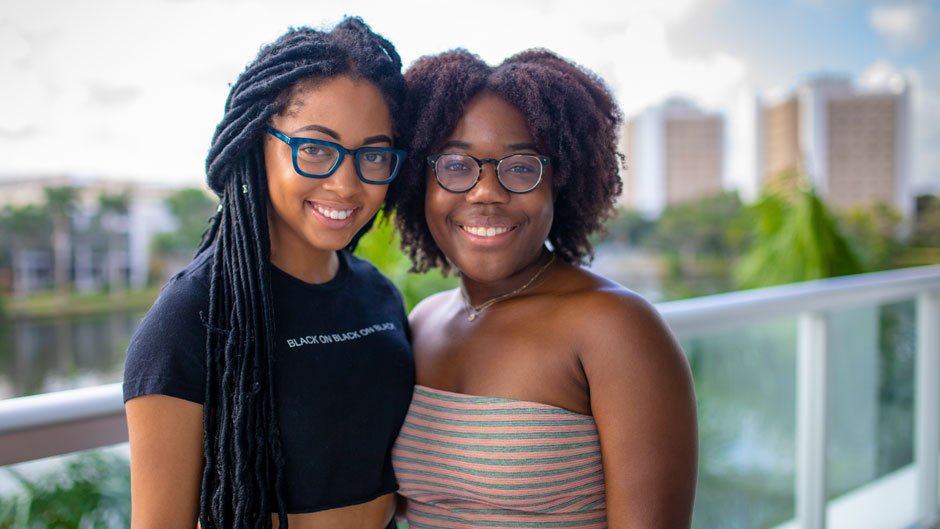The natural hair movement—being free from extensions, wigs, or straightening chemicals—is more than a hashtag on social media, it is a movement in real life. More and more people of African ancestry are embracing or returning to their roots—literally and figuratively.
Symone Philips and Deborah Adeyemi co-founded Hairology to further a mission of embracing and educating all genders, religions, and races about natural hair while defying society’s standards. Philips and Adeyemi are passionate that the new University of Miami student organization will create a safe space on the institution’s campus.
The emergence of the natural hair movement has brought a lot of focus to self-love, empowerment, acceptance, and wellness within the black and brown communities. Hairology uses its platform as a resource and inspiration for individuals to embrace their natural hair and teach others about its significance.
At UM, Hairology has amassed great interest since its inception in January 2018. Philips and Adeyemi agree that the rising awareness in unaltered black hair is not merely a trend. Currently, the group has 50 members and is looking to grow.
“My co-founder and I both felt like it was a conversation that needed to be had on campus,” said Philips, a senior majoring in marketing and management. “The reception has been amazing.”
The two met during their freshman year and bonded over their natural hair. When Philips approached Adeyemi about the possibility of starting the organization, Adeyemi, a senior double majoring in psychology and health science agreed. “It was something the predominately white institution was lacking and could benefit from,” said Adeyemi.
“We want people to be able to have a safe space, to have conversations about what they are going through with their natural hair and to feel like they have a community to go to,” added Adeyemi.
Not only is Hairology focused on individuals embracing their natural hair, the organization also advocates for social justice. From the military to the classroom, women and girls with natural hair have received harsh disciplinary action for “violating” uniform code. The organization believes that if members share their personal experiences and journeys, such stories will help silence negative stereotypes about black hair.
“Educating as many people as you can to refute their lack of knowledge is key,” said Philips. “The more people that you can tell about your culture and specifically about your hair, the more people will be knowledgeable about the situation in the future.”
Many African-American and Afro-Latina women use a chemical, known as a perm or relaxer, to alter the internal structure of their hair. This causes irreversible damage to the coils or texture, making the hair resistant to returning to its natural state. When an individual decides to rid their hair care routine of chemicals, wigs, and extensions, it is considered a symbol of empowerment among the natural hair community.
In recent years, major beauty companies have responded positively to the natural hair care surge. The mass retailer, Target, introduced a “natural hair care” section. Pop culture is also joining the conversation of “going natural” and digging deeper into how black hair functions in society. Most recently, Netflix released an original movie, Nappily Ever After, which depicts a black woman’s natural hair journey.
“My freshman year of high school I started watching natural hair videos on YouTube,” said Adeyemi. “I would see all the different curl patterns, and I was like, ‘Oh my goodness, my hair doesn’t look like this.’ At the end of my freshman year, I decided to stop getting a perm to just see what my hair would look like honestly. Since then I’ve been wearing my natural hair and learning more about it.”
Last semester, Philips and Adeyemi hosted “Black Hair in the Workplace,” a panel discussion during which six different UM faculty and staff members talked about how their experiences at UM and how their hair have affected them. They also hosted the event “Be Your Own Chemist,” where attendees learned the importance of knowing the ingredients in hair products, as well as a “DIY Hair Mask” workshop.
Hairology wants others to know that regardless of a person’s individual choice to wear their hair natural or not, it is important to have healthy hair overall and to never feel pressured to make a decision.
Said Adeyemi, “My main goal is to be able to have a community for women of color—anyone in general—on campus that wants to come and talk about their natural hair and how to have healthy hair. I think that's the most important thing. It doesn't matter if your hair is permed, natural or if you wear weaves all the time. It just matters that you are taking care of your hair.”

